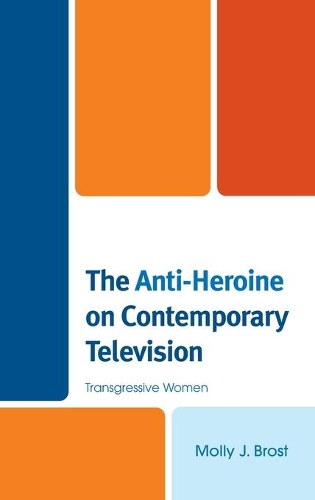
The Anti-Heroine on Contemporary Television: Transgressive Women
(Hardback)
Publishing Details
The Anti-Heroine on Contemporary Television: Transgressive Women
By (Author) Molly J Brost
Bloomsbury Publishing PLC
Lexington Books
24th November 2020
United States
Classifications
General
Non Fiction
Media studies
Gender studies: women and girls
791.456522
Physical Properties
Hardback
122
Description
In The Anti-Heroine on Contemporary Television: Transgressive Women, Molly Brost explores the various applications and definitions of the term anti-heroine, showing that it has been applied to a wide variety of female characters on television that have little in common beyond their failure to behave in morally "correct" and traditionally feminine ways. Rather than dismiss the term altogether, Brost employs the term to examine what types of behaviors and characteristics cause female characters to be labeled anti-heroines, how those qualities and behaviors differ from those that cause men to be labeled anti-heroes, and how the label reflects society's attitudes toward and beliefs about women. Using popular television series such as Jessica Jones, Scandal, and The Good Place, Brost acknowledges the problematic nature of the term anti-heroine and uses it as a starting point to study the complex women on television, analyzing how the broadening spectrum of character types has allowed more nuanced portrayals of women's lives on television.
Reviews
Feminist media scholar Molly Brost adds effectively to the work of scholar Margaret Tally and journalist Emily Nussbaum, arguing that "anti-heroines" may simply be complex female characters. She discusses commonly accepted anti-heroines, such as Jessica Jones or Olivia Pope, but also more comedic characters on The Good Place and Don't Trust the B----- in Apartment 23, discussing ideas like the fun "bitch," mentally ill characters, and "likability." She notes, "Focusing on a woman's likability . . . can drastically affect everything from what types of shows get made to who gets elected to public office."
--Cindy Conaway, SUNY Empire State CollegeMolly Brost considers a lively company of transgressive female characters, contextualizing her analysis within the scope of the established anti-hero narrative and bringing critical attention to popular series, as well as those that have been largely overlooked by critics, like Don't Trust the B---- in Apartment 23. Brost does an excellent job of highlighting the complexity of these figures, their capacity for change, and how their representations and viewers' responses are profoundly shaped by contemporary gender roles and expectations, as well as characters' agency and perceived likeability.
--Alissa Burger, Culver-Stockton CollegeWhat does it mean to be an anti-heroine What makes a woman unlikable And why do we enjoy morally ambiguous protagonists The Anti-Heroine on Contemporary Television: Transgressive Women explores the concept of the female anti-hero, examining a wide variety of popular television characters. From Jessica Jones to Crazy Ex-Girlfriend to Scandal and You're the Worst, the book extends research on the anti-hero archetype, providing insight into the ways in which gender, femininity, and sexuality construct the anti-heroine and how television has created a space for more complex representations of women that go beyond the femme fatale.
--Stephanie L. Young, University of Southern IndianaAuthor Bio
Molly Brost is assistant professor of English at the College of Saint Mary in Nebraska.
